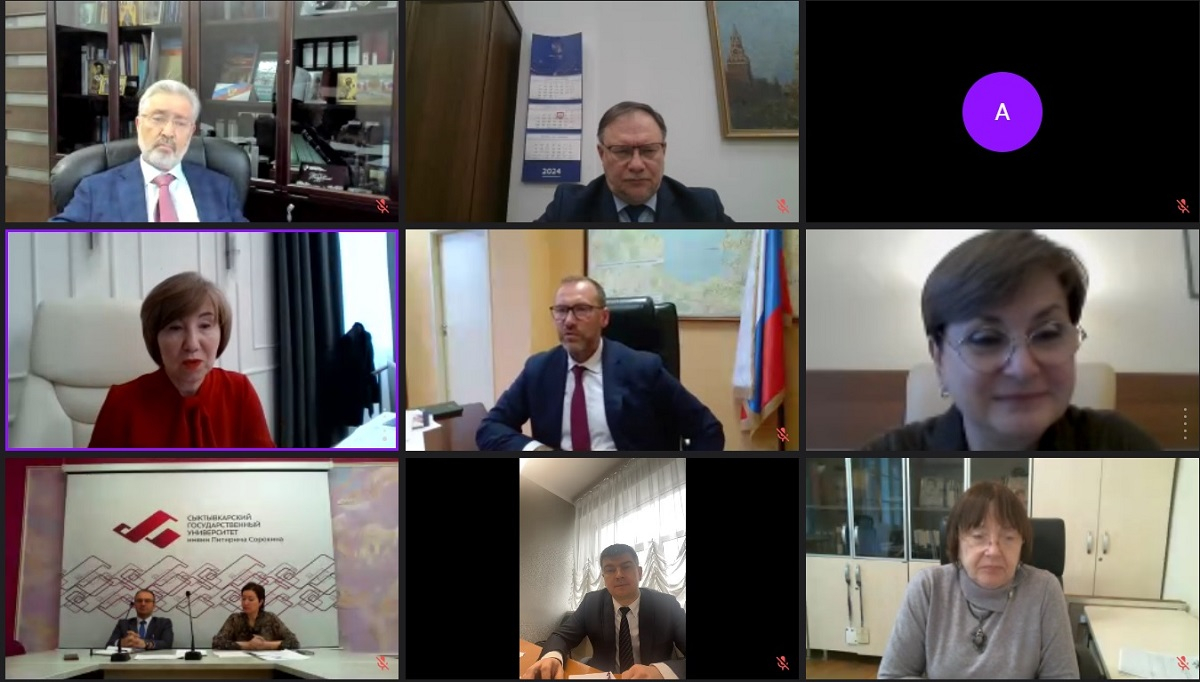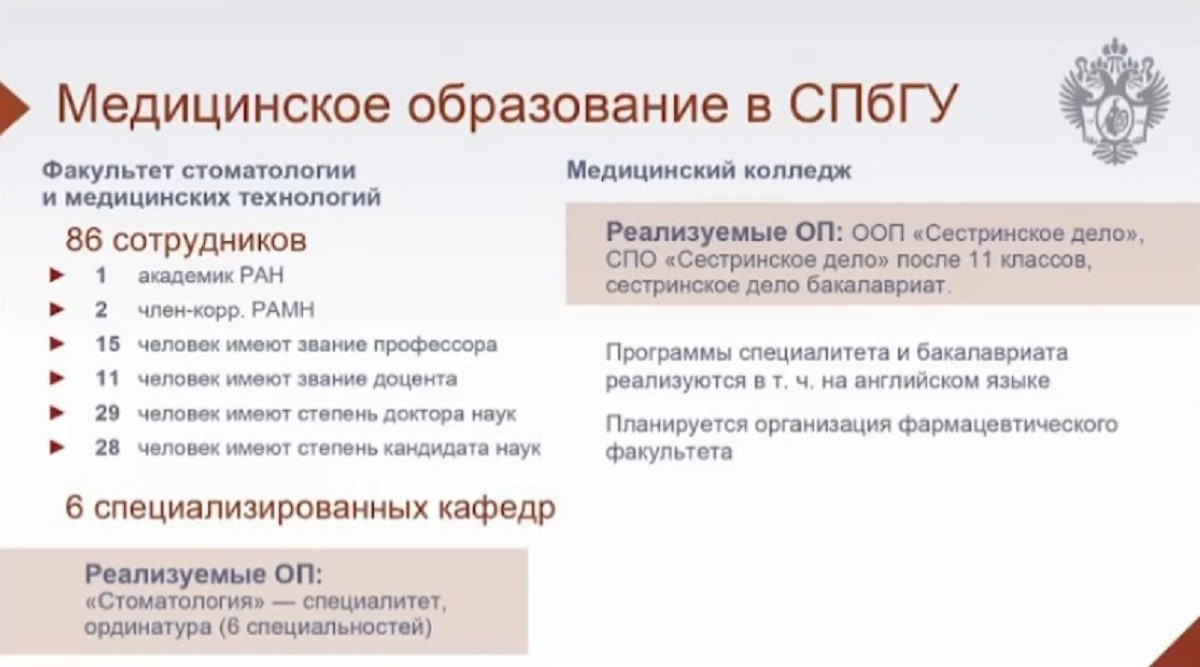Employer-sponsored education, network programmes and uniform standards for training doctors. St Petersburg University identified the main tools for improving the quality of medical education

St Petersburg University has held a meeting of the Council of Rectors of Higher Education Institutions of the Northwestern Federal District. In development of the resolution of the Russian Union of Rectors, representatives of the universities of the Northwestern Federal District discussed the improvement of medical education, including in non-medical universities, in order to strengthen the human resources potential of healthcare.
The main areas of joint activity include the development of employer-sponsored education, expansion of network programmes and strengthening of interaction between universities and healthcare institutions.
Heads of higher education institutions discussed ways to improve medical education and strengthen the healthcare workforce.
During the meeting, Deputy Minister of Science and Higher Education of the Russian Federation Dmitry Afanasiev emphasised the importance of developing a unified educational policy and standards for medical universities. As Dmitry Afanasiev explained, medical personnel are currently being trained at 127 universities in the country. Forty nine out of them are subordinate to the Ministry of Health, while 56 are under the Ministry of Science and Higher Education. The Russian Government also has a number of universities that teach medicine and private universities and research organisations that implement programmes in medicine. "This is a huge network, very different not only in geographical location, but also in the quality of training, the quality of applicants and, accordingly, the quality of the teaching and learning process, equipment, infrastructure, and the structure of interaction with regional health authorities and clinical outpatient organisations," said the Deputy Minister.
There are 363,000 students studying in medicine programmes in Russia today. This is approximately 12% of the entire student body in the country.
It is fundamentally important to form uniform approaches to the quality of medical education regardless of the departmental subordination of the university, which will allow achieving a high level of training of specialists throughout the country, said Dmitry Afanasiev. Uniform requirements for the conditions for implementing the programmes in medicine, teaching staff, clinical bases, premises, and material and technical support must be introduced into federal state educational standards, experts agreed.
The meeting participants said that one of the key tools in the development of medical education is employer-sponsored education of future doctors. Marina Lavrikova, Senior Vice-Rector for Academic Activities at St Petersburg University, emphasised: "Our goal is to prepare the best specialists not only for science, although without science medicine, in my opinion, cannot exist, but first of all for practical healthcare. The cooperation between St Petersburg University and the healthcare authorities of St Petersburg, the Leningrad Region, and the regions of the Northwestern Federal District is very important for the development of employer-sponsored education, which we are actively implementing at the University. In recent years, more than 90% of our students that study clinical residency programmes on a government-funded basis study under employer-sponsored education."
Another tool that, according to experts, can help improve the quality of medical education, especially in regional universities, is network interuniversity programmes. These programmes can include, in addition to universities, scientific organisations and real sector organisations. The network interaction can ensure that participants can exchange methods and resources.
The heads of medical universities also discussed the scientific potential of Russian medical university training. Elena Chernova, Deputy Chairperson of the Academic Council of St Petersburg University, Academic Secretary of St Petersburg University: "One of the priorities of the state policy of Russia is to strengthen the health of citizens. To solve this problem, emphasis should be put on the training of a new generation of doctors who are equipped with deep knowledge in the field of natural, humanitarian, and clinical disciplines. The University, as a leading scientific, educational, and research centre, which has celebrated its 300th anniversary this year, meets these requirements." The expert potential of St Petersburg University covers almost all existing areas of knowledge. Particular attention is paid to interdisciplinary research.
The powerful Research Park was opened and is effectively operating at St Petersburg University, with more than 26 resource centres, the potential of which can be used to conduct research in medical and biological areas, said Elena Chernova. "It is essential not only to prepare personnel for Russian healthcare and science, but also to give young specialists the opportunity to develop and grow professionally," said Elena Chernova.
Piotr Yablonsky, Vice-Rector for Medical Activities at St Petersburg University, emphasised the University’s unique achievements in training medical specialists: "Our programmes allow us to make the best use of the advantages of the unique university multidisciplinary environment. We strive to prepare not just doctors, but researchers who are equipped with knowledge in IT and are capable of conducting scientific work." Student course projects and graduation projects, as a rule, become the basis for future scientific publications and candidate’s dissertations, he said.

Piotr Yablonsky also spoke about the University’s new international project, i.e. an international branch in Cairo, which offers academic programmes in English. Today, it offers four academic programmes: "General Medicine," "Dental Medicine," "Pharmacy," and "Physical Therapy." "The project gave us an impetus to improve our programmes and made it possible to reconsider the approach to training specialists," said Piotr Yablonsky. He also emphasised that the new standards in education will help prepare high-level specialists capable of working in various regions of the world.
Natalya Ilyina, Rector of Pskov State University, presented regional experience in developing a programme of continuous training of medical personnel, starting with specialised medical classes in schools and ending with clinical residency programmes. Pskov State University strives to support high-quality medical education, solving the problems of personnel shortage, developing effective cooperation with the Health Committee of the Pskov Region and a number of other regional institutions, she added.
The presentation by Veronika Ostapenko from the North-Western State Medical University named after I.I. Mechnikov focused on the issues in mentoring and attracting students to clinical bases: "The mentor directly ensures the contact work of the student in a clinical residency programme at the base, and the university controls, sometimes remotely, the work of both the mentor and the student. If such an opportunity were included in the standards, it would significantly improve the legal situation." Mentoring and interaction with clinics help train future specialists and retain them in place, which provides stability to the regional healthcare system and helps to retain young specialists.
Marina Lavrikova called on the participants of the meeting to pay attention to the issue in mentoring at universities: "A student in any programme, primarily medical programmes, arriving at a certain base where they must gain practical experience, inevitably interacts with a specialist who supervises them. We understand that in medicine such a mentor is simply necessary."
The meeting participants also paid attention to the prospects for inter-level interaction between colleges, universities, and scientific organisations. They also discussed promising trends in interaction between medical education and other areas, e.g. the development of digital tools, clinical psychology, and engineering technologies.

